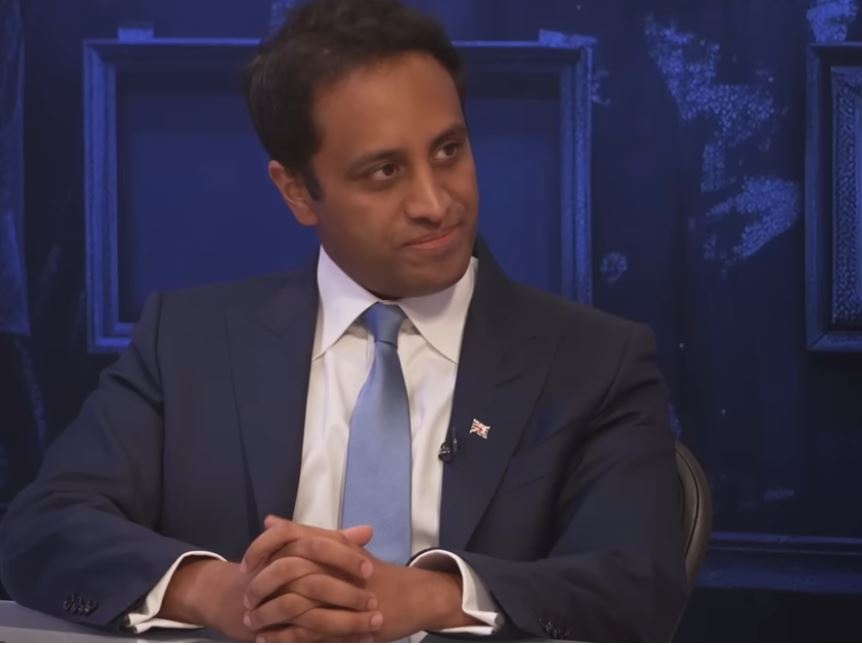Zia Yusuf Net Worth Revealed – From £31M Tech Sale to Political Influence

Muhammad Ziauddin Yusuf was born in Bellshill, Scotland, in 1986. His journey reflects the hard work of a self-made leader. Early on, Yusuf was instilled with the values of commitment and service by his parents, who were immigrants from Sri Lanka who worked for the NHS. His future would be shaped by the scholarship he received to Hampton School in southwest London, where he also met Alex Macdonald, his future collaborator.
He graduated from the London School of Economics in 2009 with a Bachelor of Science in International Relations, demonstrating his academic prowess. He soon made his way into the competitive world of finance, landing positions at Goldman Sachs and Merrill Lynch. He worked with industry titans like Fiat and Airbus there, specializing in European defense and automobiles. Yusuf quickly rose to the position of executive director at Goldman, where he learned about boardroom dynamics but felt a calling of his own.
| Full Name | Muhammad Ziauddin Yusuf |
|---|---|
| Born | 1986, Bellshill, North Lanarkshire, Scotland |
| Nationality | British |
| Education | Hampton School (scholarship), LSE BSc International Relations |
| Early Career | Merrill Lynch, Goldman Sachs – Executive Director |
| Entrepreneurial Venture | Co‑founder & CEO of luxury concierge app Velocity Black |
| Notable Transaction | Sold Velocity Black to Capital One for £233 million in 2023 |
| Estimated Net Worth | ~£31 million |
| Political Roles | Chairman of Reform UK (July 2024–June 2025); Head of Reform UK Department of Government Efficiency (since June 2025) |
| Political Affiliation | Reform UK (since July 2024); formerly Conservative |
| Reference | https://en.wikipedia.org/wiki/Zia_Yusuf |
An emotional farewell that brought attention to the personal costs of finance was a turning point at a senior celebration. Motivated to forge his own route, Yusuf quit Goldman in 2014 to co-found the upscale concierge app Velocity Black. The platform, a digital butler that grew quickly, catered to wealthy customers looking for customized experiences with flair and ambition.
The growth of Velocity Black was nothing short of explosive. In 2015, the company topped Apple’s Best Apps list, and in 2018, revenues nearly tripled. By 2023, Yusuf and Macdonald agreed to Capital One’s £233 million acquisition. An estimated £31 million was earned by Yusuf himself; this financial windfall changed the course of his future actions.
That wealth turned into a way to enter politics. Yusuf discovered political chemistry with Nigel Farage at a political fundraiser. He became the biggest donor to Reform UK by the middle of 2024. His conservative economic views and support for a strict immigration policy were reaffirmed in interviews and social media posts.
He was appointed Chairman of Reform UK in July 2024. However, a few days later, news sources reported that he had left the Conservative Party, allegedly at the party’s request. These changes strengthened his Reform credentials rather than hurting him.
After briefly resigning in June 2025 due to a public dispute involving an MP, Yusuf returned a few days later as the head of Reform’s newly established Department of Government Efficiency, or “DOGE,” which echoes Elon Musk’s own lean governance philosophy. By doing this, he contributed not only money but also a desire to reform public spending and professionalize operations.
His wealth from the luxury sector has drawn criticism for possibly alienating ordinary voters. His detractors claim that a tech billionaire is unaware of the difficulties that regular Britons face on a daily basis. Supporters, however, view his path—from immigrant origin to prosperous businessman—as representative of the aspirational British story.
Yusuf has forged a distinct ideological vision in spite of partisan differences: a combination of strict immigration control, economic pragmatism, and rebuilding public institutions’ credibility. He echoes his own upbringing as a British Muslim patriot by framing Britain’s identity as secure yet inclusive. He was cited in March 2025 as supporting lawful immigration, reaffirming his family’s journey, and advocating for strict regulations to maintain equity.
Under his direction, Reform UK’s membership soared to almost 200,000, and in early 2025, it briefly topped YouGov polls. The goal is to cause a radical change in British politics by growing the number of MPs from a small group to over 300.
Internal strain, however, has surfaced. Charges of centralization were raised when MP Rupert Lowe was suspended following alleged threats. There were a total of twelve resignations from branches. In response, Yusuf has asserted that rigorous screening is necessary for rapid growth, which is a daring and methodical approach in contrast to traditional political ferment.
Reform has been able to expand grassroots infrastructure, hire media strategists, and draw in top-tier candidates thanks to his £31 million net worth. Yusuf contrasts traditional party-building techniques with the process of creating a digital startup. He has prioritized adaptive efficiency over traditional politics during significant leadership transitions.
This mentality is demonstrated by anecdotal evidence: at a nationwide campaign event, Yusuf allegedly gave a volunteer a list of duties with almost military precision, including data oversight, logistics, and press coordination. Later, the volunteer called the atmosphere “shockingly corporate—for a political wallop.”
His admiration for Elon Musk’s “act with speed” approach further enhances his profile and demonstrates his acceptance of cross-sector influences. His DOGE title was supposed to be a sign of change—more delivery, less debate.
In terms of economics, his wealth is a resource used for long-term planning. At an estimated £31 million, it is more than just personal wealth. It makes traditional parties pay attention by indicating a readiness to fund large-scale initiatives.
In speeches, Yusuf compares his political movement to a swarm of bees, each of whom works toward a common goal and is purposefully coordinated. It’s a metaphor that contrasts his goals with traditional party structures by portraying them as decentralized but disciplined rather than top-down.
In the future, it will be interesting to see how his wealth and politics intersect. Will Reform UK benefit from his financial influence, or could it strengthen the case against elitist influence? Yusuf has responded thus far by emphasizing openness and democratic procedures, such as internal votes and open policy drafting. He stresses that control is not correlated with contribution scales.
Resilience is demonstrated by his June retirement from the chair position and his prompt return to DOGE. He acknowledged his frustration with internal communication breakdowns and called the initial departure “hurried.” His return reaffirmed his dedication and implied that he would not personally tolerate failure to realize his vision.
Yusuf has highlighted his track record in interviews with the media, including the launch of a global app that sold for a high seven-figure return and the exportation of that mindset into public service. He presents himself as an operator who applies private-sector discipline to public challenges rather than as a career politician.
In the end, his estimated net worth of £31 million has financed a new kind of political business that combines technology, professional management, and capital. He is a pioneer in the cross-sector and is creating an organization that is more like a tech startup than a party machine. In the coming years, his success—or failure—could change the way political parties are organized and funded.
Amid establishment skepticism and ideological conflicts, Yusuf’s investment signals a turning point toward modernization. His plan has the potential to change organizational culture and political finance if it is successful. If it fails, it might highlight the boundaries of political wealth.



